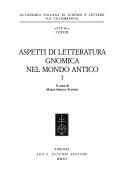| Listing 1 - 10 of 15 | << page >> |
Sort by
|
Book
ISBN: 9782251453811 2251453814 Year: 2022 Publisher: Paris : Les Belles Lettres,
Abstract | Keywords | Export | Availability | Bookmark
 Loading...
Loading...Choose an application
- Reference Manager
- EndNote
- RefWorks (Direct export to RefWorks)
Amusantes souvent, irritantes et même dérangeantes parfois, les maximes transmises depuis l’Antiquité par de nombreux recueils voués à satisfaire siècle après siècle différents publics sont dans leur grande majorité anonymes, même si l’on reconnaît çà et là des extraits de Ménandre ou d’autres poètes comiques et tragiques connus. C’est néanmoins sous le titre de Sentences de Ménandre qu’on se plait souvent à les mentionner. Nées en Grèce, christianisées, traduites en arabe, en slavon, elles ont connu de multiples remaniements et adaptations ; en plus du corpus principal d’un bon millier de maximes, nous avons voulu joindre les recueils retravaillés par Grégoire de Nazianze, Maxime Planude et Georges Hermonyme en raison de leur cohérence, et nous avons ajouté les variations construites sur les joutes oratoires sans nul doute fictives entre Ménandre et Philistion, qui connaissent quatre versions. Le lecteur distinguera dans ces corpus, outre les bons mots qui sont le sel des discussions entre amis, les thèmes de prédilection de notre culture occidentale, inlassablement repris pour transmettre sans doute les valeurs qui devaient garantir la cohésion et le bon ordre de la société. De l’école aux conversations de dîners entre gens de bonne compagnie, ces maximes sont parvenues jusqu’à nous : certaines sont démodées, d’autres restent universelles, et on aime à penser que notre XXIe siècle en supprimera certaines et en ajoutera de nouvelles, continuant ainsi la longue chaîne de cette littérature dite gnomolque, celle des maximes sentencieuses ou satiriques."
Book
Year: 1784 Publisher: Argentorati : In bibliopolio academico,
Abstract | Keywords | Export | Availability | Bookmark
 Loading...
Loading...Choose an application
- Reference Manager
- EndNote
- RefWorks (Direct export to RefWorks)
Book
Year: 1817 Publisher: Lipsiae : Fleischer,
Abstract | Keywords | Export | Availability | Bookmark
 Loading...
Loading...Choose an application
- Reference Manager
- EndNote
- RefWorks (Direct export to RefWorks)
Book
Abstract | Keywords | Export | Availability | Bookmark
 Loading...
Loading...Choose an application
- Reference Manager
- EndNote
- RefWorks (Direct export to RefWorks)
Book
Year: 1823 Publisher: Parisiis : Apud Lefevre Bibliopolam,
Abstract | Keywords | Export | Availability | Bookmark
 Loading...
Loading...Choose an application
- Reference Manager
- EndNote
- RefWorks (Direct export to RefWorks)
Book
Year: 1591 Publisher: Francofvrti : Apud Ioannem Wechelum & Petrum Fischerum consortes,
Abstract | Keywords | Export | Availability | Bookmark
 Loading...
Loading...Choose an application
- Reference Manager
- EndNote
- RefWorks (Direct export to RefWorks)
Book
Abstract | Keywords | Export | Availability | Bookmark
 Loading...
Loading...Choose an application
- Reference Manager
- EndNote
- RefWorks (Direct export to RefWorks)
Book
ISBN: 9781611434880 1611434882 1463203209 Year: 2013 Publisher: Piscataway, NJ: Gorgias Press,
Abstract | Keywords | Export | Availability | Bookmark
 Loading...
Loading...Choose an application
- Reference Manager
- EndNote
- RefWorks (Direct export to RefWorks)
The Sentences of the Syriac Menander appears in two Syriac manuscripts in the British Library, a full version in one codex, and a far shorter version, only a small fraction thereof, in another. This book presents a commentary on the text in its complete version focusing on parallels from both Jewish tradition and the Greco-Roman world, showing that the text is not, as it claims, the work of the Greek author Menander, but rather a work of Jewish Wisdom Literature composed in Syriac, possibly in the ancient city of Edessa itself, and preserved within Christian monastic circles. The first chapter traces previous scholarship, reconstructs the manuscript’s history, explains how it ended up at the British Library, attempts to date both the present and underlying texts, gives information concerning its provenance, organization, language, genre, and attribution to Menander, and discusses The Sentences of the Syriac Menander as a Jewish pseudepigraphical work. The second chapter presents the first rendition of the Syriac text since the initial work done in the mid 19th century, based on observation of the manuscript with modern lighting and visual aids, gives philological and textual notes and offers a new English translation of the material. A continuous commentary on the full text follows in the third chapter, and the conclusion sets forth what the parallels and comments have to teach about the reception of biblical and extra-biblical material in a part of the world of early Christianity about which not a great deal is known.
Gnomic poetry, Greek --- Quotations, Greek --- Menander, - of Athens

ISSN: 00650781 ISBN: 8822254007 8822252152 9788822252159 9788822254009 Year: 2004 Volume: 218 Publisher: Firenze L.S. Olschki
Abstract | Keywords | Export | Availability | Bookmark
 Loading...
Loading...Choose an application
- Reference Manager
- EndNote
- RefWorks (Direct export to RefWorks)
Recueil issu d'une Rencontre sur "Aspetti di trasmissione di letteratura gnomologica e apoftegmatica" tenue près l'École normale supérieure de Pise, du 5 au 7 juin 2003
Gnomic poetry, Greek --- Poésie gnomique grecque --- Poésie gnomique grecque --- History and criticism --- Histoire et critique --- Menander, --- Menander of Athens. Menandrou gnomai --- Congresses --- Gnomic poetry [Greek ] --- Greek literature --- Gnomic poetry, Greek - Congresses.
Dissertation
Year: 1886 Publisher: Toulouse : Chauvin,
Abstract | Keywords | Export | Availability | Bookmark
 Loading...
Loading...Choose an application
- Reference Manager
- EndNote
- RefWorks (Direct export to RefWorks)
Bible --- Gnomic poetry, Hebrew. --- Gnomic poetry, Greek. --- O.T. --- Psalms --- Criticism, interpretation, etc. --- Theognis Criticism and interpretation. Bible. O.T. Proverbs. — Criticism, interpretation, etc. Ethics in the Bible. Gnomic poetry, Hebrew. Gnomic poetry, Greek. Ethics — Greece.
| Listing 1 - 10 of 15 | << page >> |
Sort by
|

 Search
Search Feedback
Feedback About UniCat
About UniCat  Help
Help News
News